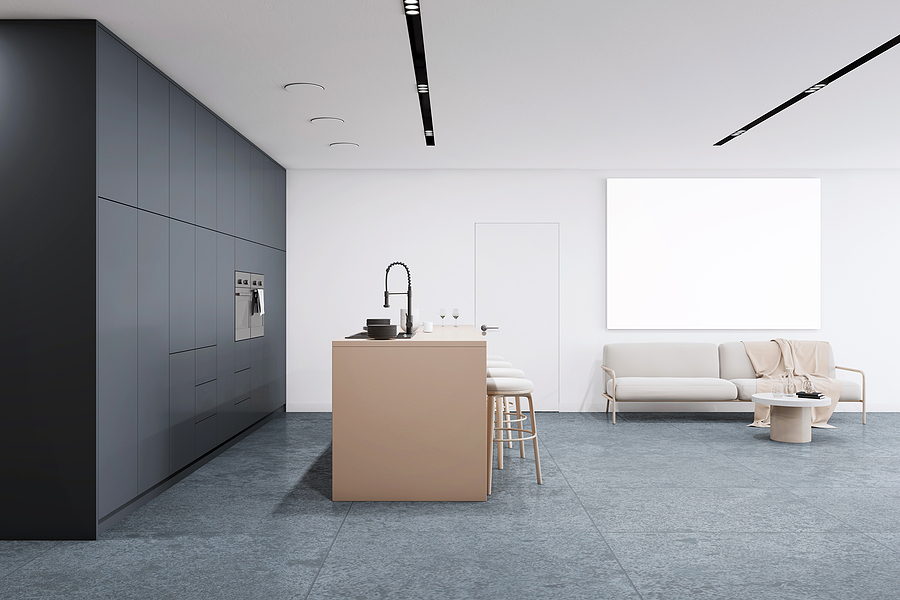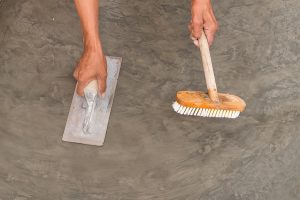When choosing the right flooring for your home, the options can be overwhelming. From hardwood and tile to vinyl and carpet, each material has its own set of advantages and disadvantages. However, concrete stands out in the debate of concrete vs. other flooring for its unmatched versatility and durability.
Comparing Concrete Vs. Other Flooring
In this analysis, we’ll compare concrete with other popular flooring materials to help you make an informed decision.
Durability
Let’s how concrete stands up to other flooring when it comes to durability.
Concrete
Concrete is one of the most durable flooring materials available. It can withstand heavy foot traffic, furniture, and even the wear and tear of pets.
Once sealed, concrete is resistant to scratches, stains, and moisture, making it ideal for both residential and commercial spaces. Its longevity is unmatched, often lasting for decades without the need for significant repairs.
Hardwood
While hardwood floors are also durable, they are more susceptible to scratches, dents, and water damage. Over time, hardwood may need refinishing to maintain its appearance, which can be costly.
Tile
Tile flooring is durable and resistant to water, making it a popular choice for bathrooms and kitchens. However, tiles can crack under heavy impact, and the grout lines can stain or require frequent cleaning.
Vinyl
Vinyl is durable and water-resistant, but it’s not as tough as concrete. Sharp objects or heavy furniture can damage it, and it might not last as long as concrete in high-traffic areas.
Carpet
The carpet is soft and comfortable, but it is not nearly as durable as concrete. It can stain easily, wear down in high-traffic areas, and may need replacement every few years.
Maintenance
When comparing flooring types, you’ll want to consider the required maintenance.
Concrete
Concrete floors are low-maintenance. Once sealed, they require minimal upkeep—just regular sweeping and occasional mopping. Re-sealing every few years keeps the surface protected and looking fresh.
Hardwood
Hardwood requires regular maintenance, including sweeping, mopping, and sometimes polishing. It can also be prone to scratches and water damage, which might necessitate refinishing or repairs.
Tile
Tile floors are relatively easy to maintain, but grout lines can be tricky. They can stain or collect dirt over time, requiring more intensive cleaning or resealing.
Vinyl
Vinyl floors are easy to clean with regular sweeping and mopping. However, they can be prone to scuffing and may require occasional repairs.
Carpet
Carpet demands more maintenance than other flooring options. Regular vacuuming is necessary to keep it clean, and it may require deep cleaning or stain removal treatments periodically.
Cost
One of the biggest deciding factors is always cost when picking flooring.
Concrete
Concrete is cost-effective, especially when compared to high-end flooring options like hardwood or natural stone. Its longevity and low maintenance costs also make it a wise long-term investment.
Hardwood
Hardwood floors can be expensive, both in terms of material and installation. The need for occasional refinishing adds to the long-term cost.
Tile
Tile can vary in price depending on the material (ceramic vs. porcelain), but it is generally more affordable than hardwood. Installation costs can add up, particularly for complex patterns.
Vinyl
Vinyl is one of the most affordable flooring options. It’s inexpensive to install and maintain, making it a popular choice for budget-conscious homeowners.
Carpet
Carpet can be relatively inexpensive, but high-end options can be costly. It may also require replacement sooner than other materials, adding to the overall cost.
Aesthetic Appeal
When picking out flooring, aesthetic appeal matters.
Concrete
Concrete floors offer a modern, industrial look that can be customized with stains, dyes, or patterns. They can mimic the appearance of more expensive materials like marble or stone, providing versatility in design.
Hardwood
Hardwood is timeless and adds warmth to any room. It’s available in various wood types and finishes, allowing for a wide range of styles.
Tile
Tile offers a variety of design options, from classic ceramic to luxurious marble. It’s versatile but can feel cold underfoot compared to other materials.
Vinyl
Vinyl flooring has come a long way in design, now available in patterns that mimic wood, stone, or tile. However, it may not have the same high-end appeal as concrete or hardwood.
Carpet
Carpet adds comfort and warmth to a room. It’s available in many colors and textures but doesn’t offer the sleek, modern look of concrete or hardwood.
Concrete vs. Other Flooring
When comparing concrete to other flooring materials, it’s clear that concrete offers unmatched durability, low maintenance, and cost-effectiveness. While each flooring material has its own set of benefits, concrete stands out for those looking for a long-lasting, customizable, and stylish option.
Ready to transform your space with durable and stylish concrete flooring? Contact Custom Concrete Prep & Polish today to discover how we can bring your vision to life. Let us help you achieve a stunning, long-lasting finish. Visit us at Custom Concrete Prep & Polish to get started!



